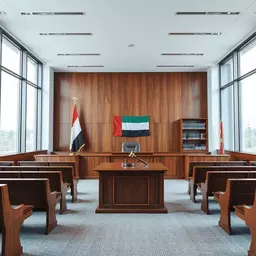
- Legal Insights
- Aug 11
2025-03-28
In the rapidly evolving landscape of Dubai's legal system, knowledge is power. Understanding the latest developments can greatly influence your business strategies and legal approaches, especially in a region that is becoming an international business hub.
Understanding the key differences between DIFC and ADGM court approaches is essential for businesses operating in Dubai.
Dubai’s legal environment is a dynamic landscape that continuously evolves, reflecting both regional and global trends. As we explore recent case studies in Dubai courts, it’s essential to understand the intricacies of this system. Legal developments here not only impact local practitioners but also resonate on an international scale, influencing diverse sectors from business to personal law.
In my journey through the legal field, I’ve seen firsthand how these case studies offer profound insights into the challenges and triumphs within the UAE's judicial system. For those engaged in legal practice or business in Dubai, staying updated with these developments is vital for informed decision-making. As we navigate this terrain, it becomes evident that a keen understanding of these trends can lead to more effective strategies and solutions.
The legal developments in Dubai are significant for several reasons. They shape not only the local legal framework but also set precedents that can influence global practices. The UAE is increasingly becoming a hub for international business, and understanding these legal trends is crucial for anyone operating in or with the region.
Let's take a closer look at some of the key factors that contribute to the significance of these legal developments:
To appreciate the recent trends in the UAE's legal landscape, we must look at the broader context. The UAE has made substantial progress in reforming its legal system, aligning it with international standards. These reforms not only streamline processes but also enhance the efficiency of dispute resolution. For more detailed information, you can refer to resources provided by the UAE government, such as the official UAE government website which offers insights into the country's legal framework.
In recent years, we have seen a notable shift towards arbitration as a preferred method for resolving disputes, particularly in commercial matters. This evolution caters to the needs of businesses looking for quicker and more flexible resolutions, which is crucial in today's fast-paced environment.
Looking to understand how criminal defense works in the UAE? Check out our guide on Understanding Criminal Defense Lawyers for clear insights into legal roles, rights, and what to expect in court.
Case studies serve as integral tools for both legal practitioners and businesses. They provide a real-world context to legal theories, highlighting successful strategies and potential pitfalls. Understanding these case studies can empower legal professionals, helping them to craft more effective arguments and strategies for their clients.
Here are some reasons why case studies are particularly important:
What are the key factors making legal developments in Dubai significant for international businesses?
Legal developments in Dubai are significant because they shape the local legal framework, attract foreign investment through clear legal protections, enhance business confidence with transparent dispute resolution, and set legal precedents impacting future case outcomes.
How do case studies benefit legal practitioners and businesses in Dubai?
Case studies offer practical insights into the application of laws and regulations, enable businesses to identify and manage risks based on past outcomes, and provide continuous learning opportunities for legal practitioners to refine their strategies.
Why is arbitration becoming a preferred method for dispute resolution in Dubai?
Arbitration is favored due to its time efficiency, confidential proceedings, and the ability to select expert arbitrators relevant to the specific dispute, making it a more flexible and quicker alternative to traditional court processes.
What are the key differences between DIFC and ADGM court rulings that businesses should be aware of?
DIFC courts are known for their flexibility in commercial matters and alignment with international standards, while ADGM courts focus on regulatory compliance, particularly in financial services; understanding these differences is crucial for effective business strategy.
What emerging trends in dispute resolution are gaining traction in Dubai?
Emerging trends include the increased use of mediation to resolve disputes amicably, innovative legal strategies tailored to Dubai's economic landscape, and enhanced transparency in court proceedings, improving predictability for businesses.
How can businesses leverage expert perspectives and legal advice regarding recent court decisions in Dubai?
Engaging with legal professionals provides insights that can shape understanding of the current legal climate, enabling businesses to adapt their legal strategies and ensure proactive compliance with regulatory changes, which is vital for maintaining operational integrity.
As we delve deeper into the realm of legal practices in Dubai, arbitration emerges as a key trend worth exploring. The perception of arbitration has shifted dramatically, establishing it as a preferred method of dispute resolution in the UAE. This evolution reflects a growing recognition of the need for prompt and efficient conflict resolution mechanisms.
Several factors contribute to this shift:
Previously, arbitration was often viewed with skepticism, but this perception has shifted. Many in the business community now recognize its benefits, leading to its increased adoption. This change can be attributed to growing awareness about its advantages, as well as the establishment of robust legal frameworks governing arbitration.
It’s fascinating to see how the legal landscape is adapting, reinforcing the importance of understanding these emerging trends for anyone navigating the business environment in Dubai!
The enforcement of arbitration clauses has become a focal point in Dubai's legal discourse. Courts are generally supportive of arbitration agreements, emphasizing their importance in maintaining business confidence. By upholding these clauses, Dubai courts contribute to a more favorable business climate, encouraging parties to engage in arbitration for dispute resolution. For a deeper understanding of international commercial arbitration, resources available from organizations like the United Nations Commission on International Trade Law (UNCITRAL) provide valuable insights.
This trend reaffirms the need for businesses to carefully draft and negotiate arbitration clauses to ensure their enforceability. Being proactive in these aspects can mitigate risks and pave the way for smoother conflict resolution in the future.
The Dubai International Arbitration Centre (DIAC) plays a pivotal role in this evolving legal landscape. It serves as a premier institution for arbitration in the region, providing a structured framework for resolving disputes. DIAC's comprehensive rules and guidelines further bolster confidence in arbitration as a viable option for conflict resolution.
As a resource for both domestic and international businesses, DIAC facilitates not only arbitration but also education on best practices. Engaging with DIAC can empower businesses to embrace arbitration more fully, enhancing their strategic response to disputes.
When drafting arbitration clauses, ensure they are clear and comprehensive to prevent potential disputes. Consider including specifics about the governing law, the location of arbitration, and the selection process for arbitrators. This proactive approach can significantly enhance the enforceability of your agreements and streamline the resolution process.
As we reflect on the recent court decisions in Dubai, it’s clear that these rulings have significant implications for international businesses operating in the region. Understanding how these legal developments can influence operations is essential for stakeholders. With the evolving legal landscape, it’s vital to stay informed about how changes can impact contractual relationships and compliance requirements.
Many businesses may wonder how recent court decisions can affect their strategies. These decisions can provide a framework that shapes everything from risk management to investment strategies. Let’s explore the key insights that emerge from recent rulings, particularly focusing on comparative analysis between DIFC and ADGM courts.
Businesses must pay close attention to the nuances of legal rulings that come from the Dubai International Financial Centre (DIFC) and the Abu Dhabi Global Market (ADGM). Both jurisdictions have their own legal frameworks, and understanding the differences can help in navigating potential challenges.
Here are some of the key differences between DIFC and ADGM court rulings:
These distinctions can significantly affect how companies plan and execute their business strategies in Dubai.
When analyzing the recent rulings from both courts, it becomes apparent that their interpretations can lead to different legal consequences. For instance, DIFC courts have taken a more business-friendly approach in certain disputes, while ADGM courts might impose stricter regulatory frameworks.
This comparative analysis is vital for legal practitioners and business professionals alike. It allows for a better understanding of how these courts may handle disputes, particularly in sectors like finance, real estate, and international trade.
The legal landscape in Dubai is continuously evolving, with new trends in dispute resolution gaining traction. Understanding these trends is crucial for businesses that aim to minimize legal risks and resolve conflicts efficiently.
Some of the emerging trends include:
One significant player in the evolving dispute resolution landscape is the Mediation Centre, Dubai. This center plays a critical role in facilitating negotiations between parties in a neutral environment. By encouraging dialogue, it helps to reduce the burden on courts and fosters quicker resolutions.
As someone who values the importance of understanding our legal ecosystem, I encourage businesses to explore the services offered by the Mediation Centre. They provide an alternative approach that can be both cost-effective and time-saving in resolving disputes.
Listening to expert perspectives on recent developments is invaluable. Engaging with legal professionals provides insights that can shape your understanding of the current legal climate in Dubai.
Many legal practitioners have shared their thoughts on how recent court rulings are influencing business operations:
These insights can help you navigate the complexities of doing business in Dubai and ensure your strategies remain effective.
Based on the latest case studies, we can derive practical legal guidance. For instance, understanding how to structure contracts in line with recent rulings can provide clarity and reduce potential disputes. I recommend consulting with a legal expert to tailor your contracts according to the latest legal insights.
Additionally, leveraging these case studies can provide a roadmap for anticipating challenges and strategically planning your operations in Dubai.
As we wrap up our discussion, I encourage everyone to delve deeper into understanding court cases and legal principles. There are abundant resources available for accessing original court documents and exploring legal precedents.
Here are some resources to consider:
These resources can empower you with knowledge and keep you informed about ongoing legal developments.
Reflecting on the evolution of Dubai's legal landscape, it’s clear that recent reforms and court rulings have profound implications for businesses and legal practitioners. Staying informed about these changes is not just beneficial; it’s essential for navigating the complexities of doing business in the UAE.
As we look to the future, I believe that ongoing legal reforms will continue to shape the way we approach business, ensuring that Dubai remains a competitive and attractive destination for international investments.
Here is a quick recap of the important points discussed in the article:
